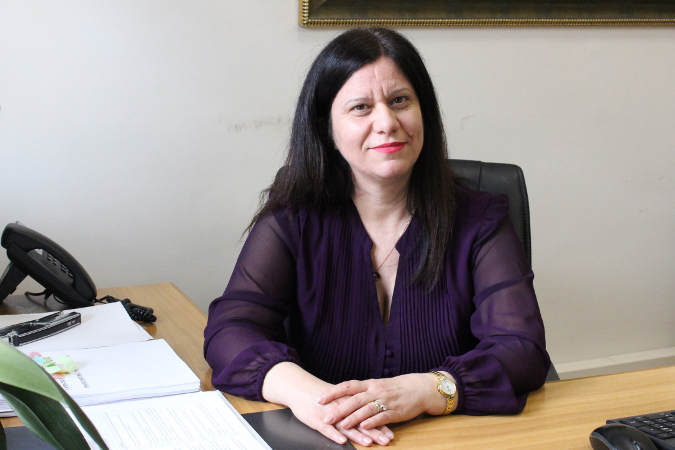Take Five: “We want to make gender-responsive budgeting a part of every state institution’s budgeting processes”
Mimoza Dhembi is the General Director of Budget at the Ministry of Finance and Economy of Albania since 2000 and is one of the pioneers of the Public Financial Management reform in Albania. She has been crucial in establishing a successful collaboration with UN Women in mainstreaming gender through the introduction of gender-responsive budgeting in the Medium-Term Budget Program. UN Women offers technical assistance in gender-responsive budgeting to the government of Albania with financial support from the Austrian Development Agency.Date:

Mimoza Dhembi. Photo credit: UN Women/Yllka Parllaku
Why did the Albanian Government introduce gender-responsive budgeting (GRB)? How does GRB advance gender equality?
Although Albania became increasingly sensitive to gender issues over the past 20 years, the biggest change began in 2013 when we introduced a gender quota for both national and local legislatures. The Government made including gender-responsive budgeting (GRB) in public expense management a specific objective in its Public Finance Management Strategy for 2014-2020. This was significant and made the public sector aware that we were committed to effective gender equality policies and to allocating the public monies necessary for them.
Gender equality for Albania means giving women and men equal access to public services and eliminating gender inequality in the public sphere. However, as Albania remains a patriarchal society, several challenges that continue to hinder stable economic and social development remain. Changing attitudes will take time. Our biggest obstacle is the widespread view that a woman’s role is not equal to a man’s.
Are Government Ministries prepared for and aware of the importance of Gender-Responsive Budgeting? How did they embrace GRB? What is the attitude of the line Ministries responsible for executing GRB policies?
With UN Women Albania’s valuable support, each year we note more and more key budget preparation actors aware of how important gender-responsive budgeting is. You see this in our Midterm Budgeting Programme, as a growing number of budgeting programmes plan and apply gender policies. There’s also greater interest in implementing gender-sensitive policies. In fact, gender-responsive budgeting is now a regular discussion point around budget negotiating tables.
Still, it would be very optimistic to say that we’ve achieved the majority of our goals. In our daily work, which is full of budgeting issues and emergencies, it is still unusual to mention gender indicators or institutions’ gender sensitivity shortcomings. However, we are legally obliged to pay attention to these issues – especially in our annual and midterm budget documentation preparation and monitoring reports. We also incentive staff to promote tangible gender-sensitive outcomes.
Albania has worked on GRB for 7 years now. How has the cooperation been with UN Women?
Our cooperation with the UN Women Office in Tirana has been very fruitful. I was in office when we were first contacted by UN Women 7 years ago and feel proud when I reflect on all that we have accomplished since then. Together we’ve achieved consistent results in meeting our targets to advance gender equality in public policy planning and execution in Albania.
This motivates me and my staff. We want to make gender-responsive budgeting a part of every state institution’s budgeting processes and to change how everyone involved in public expense management perceives gender issues. I wish to publicly thank the UN Women in Tirana team for all they’ve contributed. Despite our many daily problems and being a developing country with limited budgets, together we have set up good communication and achieved much in gender-responsive budgeting.
Albania has been among the first in the region to implement gender-responsive budgeting. Can Albania be a model for others?
It pleases me to hear that many experts point to us as a positive example for other countries in the region. Moldova and Kosovo have asked us to share our gender-responsive budgeting experiences. We’ve also been invited to join conferences to explain our gender-responsive budgeting model. Since the 2008 reform, Albania’s budget planning and management system includes many gender-responsive budgeting and performance-based elements, making us a good example for others.
What are some objectives for the coming years?
In our Public Finance Management Strategy for 2014-2020 our final objective is to include gender-responsive budgeting in Public Finance Management. This means that in the next 3-4 years, a high percentage of Government programmes must include effective gender-based policies in their Midterm Budgeting Programme. They also must at least maintain gender balance in human resources management. We will also extend gender-responsive budgeting to all local government units. UN Women’s continuous assistance is necessary if we are to achieve these objectives in a timely manner with the desired quality.
In the meantime, we will continue to monitor gender indicators and results so that we have useful data that can guide us develop future policies.